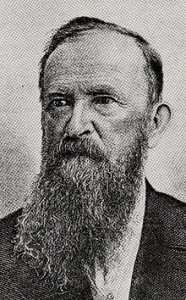James R. Graves, editor of the Tennessee Baptist and a long-time lightning rod in Baptist life, frequently publishes letters from readers who are appreciative of him. Graves’ critics fault him for his northern roots and Landmark ecclesiology. B. F. Burroughs, a Texas Baptist, offers a strong defense of Graves, as well as commentary regarding the war, in a letter published today.
Dear Bro. Graves:–I thank you very much for placing at the end of my name the time for which I had paid you for your most excellent paper. I paid you five dollars when you were on your way to the Wacco [sic] Convention, in this State, and I did not know then how I stood on your book, and never have for the last eight years, until now, and I will try to keep up now.
I am truly glad that you have resumed your original size. My financial matters are now very hard, in fact more so than ever before in my life. There is no religious interest anywhere, hardly; this unholy war has absorbed everything else. I see at every corner, and in every lane and alley, the Secular and Methodist papers are publishing and boasting of their preachers and lay members’ bravery; and what valiant soldiers they all are, to read their accounts! One would think that the Confederate army was composed of the Methodist denomination alone, gathered to fight this Abolition war, of which they had a great deal to do in the bringing of it on, by publishing to the world in their law-book, (the Discipline), as strong Abolition sentiments, ever since the days of John Wesley as ever were proclaimed from a Northern Abolition pulpit. What would have been your fate if you and your brethren had published such sentiments? They would have taken you to the rack, or the stake, and burned you because you had the moral courage merely to express your thoughts. Dr. Howell & Co., I reckon, will drop the charge of Abolitionism against you now, since your faith and works on that point are known, and read of all men. What will they resort to next, since their marriage to Method-ism, and all other sorts of Isms, to make sure of your destruction and the downfall of the Tennessee Baptist; but surely they are kicking against the pricks, or at least they are certainly beginning to think so. They have gained just such victories as the Lincoln army has in every engagement of any note that they have had with the Confederate army. The article of “The Methodists doing Penance,” in your issue of the 25th October, last, is worth the subscription. I want you to continue to make a faithful expose of all their rottenness, while you steer as straight a course as you have for the last ten years. As long as I can raise two dollars I will read your paper. Inclosed [sic] I send you two dollars, and you will please be satisfied with that until I can get some more. I will try to keep in sight of my position on your books; that will pay my account up to January, 1861. As soon as I can get more for you I will send it along, which, perhaps, will be in the course of six months.
I went to one of our Baptist brothers the other day, that has taken your paper once, and solicited him to take it again; he said no, he never would take it again. I asked him why. He said you or your agent had made him pay the subscription twice for one year, when he had the receipt to show that he had paid it. I told him there must be a mistake about the matter, someway; that I could not think you or your agent would do so, intentionally. Will you please examine your books, and see what they show in respect to this affair. His name is _____ _____, and I should like to see it corrected if it is in your power to discern it; I am satisfied that he or your folks have made a mistake in some way. He lives at this place.
I bid you God-speed in your work of love. My prayer is with you and for you.
Answer these two questions:
1. What is it that the Methodist press would not like to be heralded to the world for being the first at and doing the most of?
2. Whence came the custom and office of chaplains in the army; give the date if you can; and in what country it originated, and what was its origin?
I ask for information, as I see nothing of it in the Bible. I have no objection to our brethren preaching to armies, and going and labouring where they think they can do the most good. The army is a place where there is room for a great deal of good to be done, but the idea of going as, what is termed, a chaplain, and receiving a large salary, more than is necessarily right and proper for, the labor performed, I don’t know so well about.
I want to see things discussed in your paper. I am not opposed to our brethren being recompensed for their labors, not by any means. Your brother in Christ,
B. F. Burroughs
Source: Tennessee Baptist, December 14, 1861 (link)



